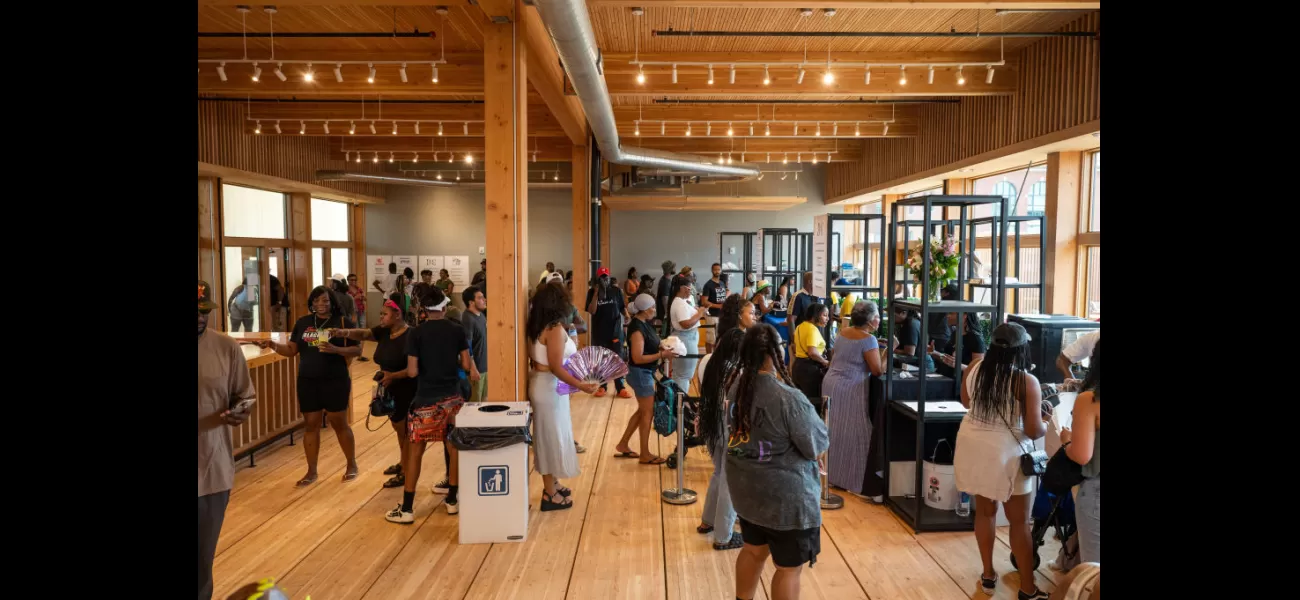"Sycamore & Oak in D.C. is a bustling retail village dedicated to supporting black-owned businesses."
Keyonna Jones, Executive Director of Congress Heights Arts Center, hopes new village will provide SE D.C. artists and entrepreneurs with capital and equity opportunities.
June 3rd 2024.

In June of 2023, the Mayor of Washington D.C., Muriel Bowser, shared exciting news with the community – the opening of Sycamore & Oak Retail Village. This unique retail center was created by and for the members of the community, with the goal of providing resources and support specifically to Black-owned businesses. It was a bold move by city leaders, recognizing the challenges faced by Black entrepreneurs in accessing the resources needed to open and grow their businesses.
As reported by PBS Newshour, the experiment has been a resounding success. Keyonna Jones, owner of Soufside Creative, an art and apparel shop, described the atmosphere of the village as a "tribe, like a Black Wall Street tribe." For Jones, Sycamore & Oak has been more than just a place to do business – it has been an incubator space where she has learned valuable professional skills and received support from her fellow business owners.
However, the journey has not been easy for Black-owned businesses. As the pandemic hit in 2020, these businesses were among the hardest hit. In response, the Sycamore & Oak retail space was created as a way to specifically support these entrepreneurs. Morgan Hawkins from @ReportingLabs highlighted this effort in a report for PBS NewsHour.
The development, led by the community and designed by Adjaye Associates, is located in the Congress Heights neighborhood – a predominantly Black and historically underinvested area in Washington D.C. Its purpose is not only to provide a space for local businesses, but also to create job opportunities for residents of the neighborhood.
While the success of the Black-owned businesses in Sycamore & Oak is inspiring, it also sheds light on the struggles faced by many Black entrepreneurs outside of this targeted effort. Bridget Weston, CEO of SCORE, a non-profit business mentoring program, has had conversations with Black business owners that have left her with the impression that there is still much work to be done to achieve parity in business. She notes that systemic issues still persist and create challenges for these entrepreneurs.
Weston explains, "Specifically, Black-owned entrepreneurs faced bigger issues with lack of childcare, were more affected by COVID-19 among themselves, their families, and their staff, and unfortunately had less access to available funds to support their businesses during the pandemic."
Chris Pyrate, owner of Chris Pyrate & Friends, a street wear apparel shop and art gallery within the retail center, expressed his desire to see the shop avoid the pitfall of gentrification. He believes that Sycamore & Oak can serve as a model for other projects, showing that it is possible to be a destination without heavily gentrifying the area.
For Jones, the success of Sycamore & Oak is a testament to the power of community and the support of fellow Black entrepreneurs. She hopes that the village will continue to thrive and serve as a beacon for other Black-owned businesses. Jones shares, "I hope that Black entrepreneurs know that they have a space within each other and within the tribe to thrive. They keep me sharp and make sure I'm always working at my highest potential, and for that, I am grateful."
The fight against gentrification and the preservation of historic neighborhoods is an ongoing battle. But with efforts like Sycamore & Oak, there is hope for a more inclusive and supportive future for Black-owned businesses.
As reported by PBS Newshour, the experiment has been a resounding success. Keyonna Jones, owner of Soufside Creative, an art and apparel shop, described the atmosphere of the village as a "tribe, like a Black Wall Street tribe." For Jones, Sycamore & Oak has been more than just a place to do business – it has been an incubator space where she has learned valuable professional skills and received support from her fellow business owners.
However, the journey has not been easy for Black-owned businesses. As the pandemic hit in 2020, these businesses were among the hardest hit. In response, the Sycamore & Oak retail space was created as a way to specifically support these entrepreneurs. Morgan Hawkins from @ReportingLabs highlighted this effort in a report for PBS NewsHour.
The development, led by the community and designed by Adjaye Associates, is located in the Congress Heights neighborhood – a predominantly Black and historically underinvested area in Washington D.C. Its purpose is not only to provide a space for local businesses, but also to create job opportunities for residents of the neighborhood.
While the success of the Black-owned businesses in Sycamore & Oak is inspiring, it also sheds light on the struggles faced by many Black entrepreneurs outside of this targeted effort. Bridget Weston, CEO of SCORE, a non-profit business mentoring program, has had conversations with Black business owners that have left her with the impression that there is still much work to be done to achieve parity in business. She notes that systemic issues still persist and create challenges for these entrepreneurs.
Weston explains, "Specifically, Black-owned entrepreneurs faced bigger issues with lack of childcare, were more affected by COVID-19 among themselves, their families, and their staff, and unfortunately had less access to available funds to support their businesses during the pandemic."
Chris Pyrate, owner of Chris Pyrate & Friends, a street wear apparel shop and art gallery within the retail center, expressed his desire to see the shop avoid the pitfall of gentrification. He believes that Sycamore & Oak can serve as a model for other projects, showing that it is possible to be a destination without heavily gentrifying the area.
For Jones, the success of Sycamore & Oak is a testament to the power of community and the support of fellow Black entrepreneurs. She hopes that the village will continue to thrive and serve as a beacon for other Black-owned businesses. Jones shares, "I hope that Black entrepreneurs know that they have a space within each other and within the tribe to thrive. They keep me sharp and make sure I'm always working at my highest potential, and for that, I am grateful."
The fight against gentrification and the preservation of historic neighborhoods is an ongoing battle. But with efforts like Sycamore & Oak, there is hope for a more inclusive and supportive future for Black-owned businesses.
[This article has been trending online recently and has been generated with AI. Your feed is customized.]
[Generative AI is experimental.]
0
0
Submit Comment





